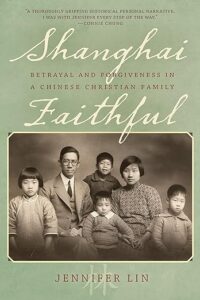On January 31, I will be hosting on an online book club discussion for our friends at ERRChina on Shanghai Faithful: Betrayal and Forgiveness in a Chinese Christian Family, by Jennifer Lin.
This book is on my list of “must reads” for anyone wanting a deeper understanding of the Christianity in twentieth century China. In 2017, I wrote a post recommending the book:
When a Catholic, Chinese American journalist discovers that her grandfather was a prominent Anglican church leader in China in the 1940s and that her grand uncle was none other than the famous house church leader, Watchman Nee, she did what every good journalist does—she set out to tell the story.
In her newly released book, Shanghai Faithful: Betrayal and Forgiveness in a Chinese Christian Family, Jennifer Lin does just that, telling the story of the tensions in the church in China as they played themselves out within one family.
Jennifer’s grandfather was Rev. Lin Pu-chi, the first Chinese president of Trinity College in Fuzhou. Her grandmother, Ni Gui-zhen was the sister of Watchman Nee. Even though her grandfather had been educated in the United States and served within the Anglican church, he was outspoken in his belief that the Chinese church needed to free itself from foreign ties and become more indigenous. After “liberation” in 1949, he remained within the official church, although over time his duties were diminished, and he and his family suffered during the Cultural Revolution.
Even before the founding of the People’s Republic, Watchman Nee was leading a movement of Christians outside of the foreign denominational structures, with an emphasis on inner spiritual life. When the Communist Party made its push to bring all of religious life under their supervision and control, Nee refused. He was imprisoned (where he eventually died) and his followers persecuted.
Through it all, however, the family hung together, even during the terrible persecution of the Cultural Revolution. This is the essence of the story.
We often think that the divisions within the Chinese church—the ones that run along political lines, not doctrinal—emerged following the Communists’ rise to power. This book reminds us that the seeds were sown well before 1949.
If you are at all interested in the historical development of the church in China, this book is a must-read.
In 2018, I interviewed Jennifer about the book and her experience researching and writing it. You can read that interview here.
Here are the details of the discussion:
ERRC Online Book Club
Wednesday, January 31, 2024
5:00 pm PST / 7:00 pm CST (US)
Online, via Zoom
Image credit: via Wikipedia, in the public domain.

Joann Pittman
Joann Pittman is Vice President of Partnership and China Engagement and editor of ZGBriefs. Prior to joining ChinaSource, Joann spent 28 years working in China, as an English teacher, language student, program director, and cross-cultural trainer for organizations and businesses engaged in China. She has also taught Chinese at the University …View Full Bio
Are you enjoying a cup of good coffee or fragrant tea while reading the latest ChinaSource post? Consider donating the cost of that “cuppa” to support our content so we can continue to serve you with the latest on Christianity in China.
